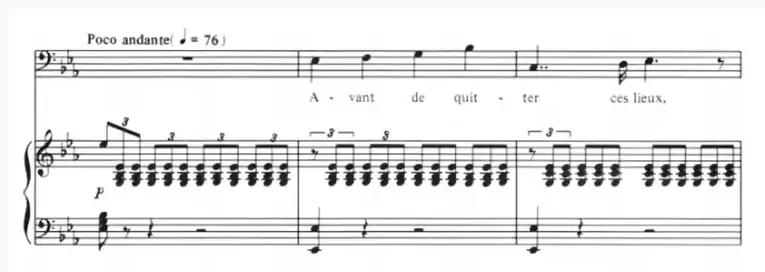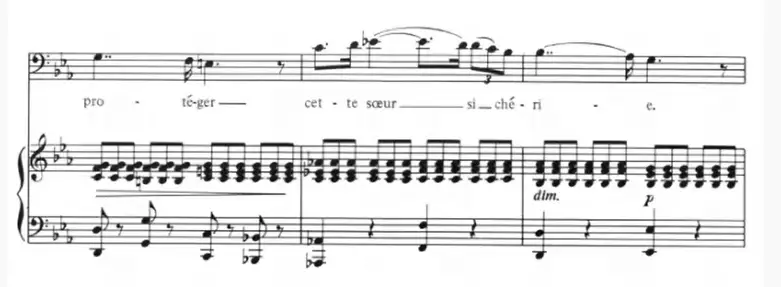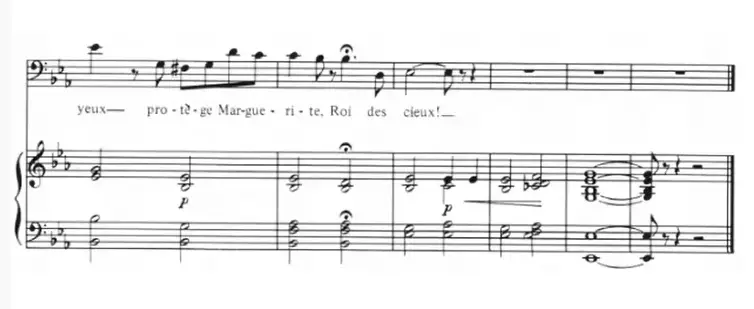AVANT DE QUITTER CES LIEUX – an aria from the opera Faust
The online opera guide of Gounod’s aria AVANT DE QUITTER CES LIEUX
Read Interesting facts and hear great YouTube Videos about the famous Aria “AVANT DE QUITTER CES LIEUX”.
If you want to hear more about the opera FAUST, click on the link to the opera portrait
The Aria – Synopsis and Background
Synopsis: Valentin has to go to war. He drinks and looks thoughtfully at an amulet of his sister Marguerite that she gave him as talisman. Her parents and her sister have died and he has to leave Margarete, who now has to live alone at home. Siebel and Wagner see him and ask why he is depressed. Valentin answers that he must leave Marguerite unprotected. Siebel offers to watch for her. Valentin thanks him, now he can join the army calmly.
This aria is one of the most popular pieces for baritones and is often sung in recitals. This aria was not yet included in the first version of the opera. Only after a baritone complained that he had no beautiful aria in the opera did Gounod insert this piece. He took a theme from the overture and turned it into this beautiful aria.
The aria consists of three parts. In the first part and Gounod shows a serious wide-ranging melody. It is solemn and contains a prayer-like text “à toi seigneur des cieux, ma soeur je confie” (“To you my lord, I entrust my sister”).
The passage “Cette soeur si chérie” (the sister who is so dear to me) must be sung with confidence and fraternal love.
In the second part, Gounod changes to a march-like theme. Should he fall in war, he will watch over her from heaven. Even if a military march theme determines the music, it is a solemn, intimate section and should not be sung roughly.
The theme of the first part comes back. A beautiful effect is that it starts in piano, which creates a nice contrast to the march-like middle section. The ending of the aria is often sung differently than Gounod composed it. It shares the fate of “Celeste Aida” that the final note is sung an octave higher to make a great effect. Creating a different mood than the composer intended.
The Aria – the text of AVANT DE QUITTER CES LIEUX
Avant de quitter ces lieux,
Sol natal de mes aïeuxA toi, seigneur et Roi des cieux
Ma sœur je confie,Daigne de tout danger
Toujours, toujours la protégerCette sœur si cherie!
Délivré d’une triste penséeJ’irai chercher la gloire, la gloire au seins des ennemis,
Le premier, le plus brave au fort de la mêlée,J’irai combattre pour mon pays.
Et si vers lui, Dieu me rappelle,Je veillerai sur toi fidèle,
O Marguerite!Avant de quitter ces lieux,
Sol natal de mes aïeux,A toi, seigneur et Roi des cieux,
Ma sœur je confie!O Roi des cieux, jette les yeux,
Protège Marguerite, Roi des cieux!
Before I leave this town,
My forefathers’ native place,
To you, Lord and King of Heaven,
Do I entrust my sister.I beg you to defend her
From every peril,
My beloved sister.Freed from this harrowing thought,
I shall seek glory in the enemy’s ranks,
The first, the bravest, in the thick of the fray,
I shall go and fight for my country.And if God should call me to his side,
I shall faithfully watch over you,
O Marguerite.O King of Heaven, hear my prayer
And defend Marguerite,
O King of Heaven.
Written for “lyrical baritone”
The role of Valentine is written for a lyrical baritone. The lyrical baritone must have a supple voice and be able to convince with brilliance in height. Combined with youthful vocal power, this leads to an expressive sound.
Famous interpretations of AVANT DE QUITTER CES LIEUX
Hvorostovsky sings the ending effectively with a long and highly sung final note.
Avant de quitter ces lieux – Hvorostovsky
Blanc was a representative of the French school and is hardly known outside France.
Oh sainte médaille … Avant de quitter ces lieux – Ernest Blanc
Fischer Dieskau sings the ending as it was written.
Avant de quitter ces lieux – Fischer-Dieskau
Hampson’s interpretation is more masculine, more demanding and less religious.
Oh sainte médaille … Avant de quitter ces lieux – Hampson
Merrill had an lush, colorful voice that comes into its own wonderfully in this piece.
Oh sainte médaille … Avant de quitter ces lieux – Merrill
Peter Lutz, opera-inside, the online opera guide to the aria “AVANT DE QUITTER CES LIEUX” from the opera Faust from Charles Gounod.







Leave a Reply
Want to join the discussion?Feel free to contribute!